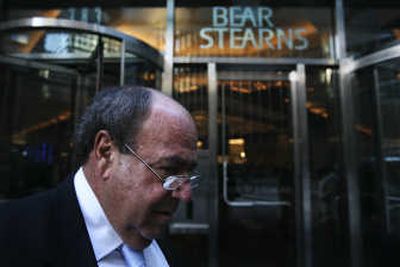Gloom prevails at Bear Stearns

NEW YORK – Just a few blocks from Bear Stearns’ soaring headquarters on Manhattan’s Madison Avenue, revelers in fuzzy green hats, beads and kilts were marching in the annual St. Patrick’s Day parade.
There was a parade of a different sort at the building.
Bear Stearns Cos. employees trudged boxes of their personal belongings out of the investment bank while managers from JPMorgan Chase & Co., which bought its rival on Sunday for a meager $2 a share, filed into it for the first time from their headquarters directly across the street.
Other Bear Stearns employees huddled in the chilly New York wind to smoke cigarettes and talk.
“It’s my first job after school,” said Ki Biyung, a Bear Stearns operations analyst. “It’s overwhelming for me.”
“I thought it was a big company, it’ll be good experience,” he said. “Now, after a couple of months, something like this happens.”
It was an ignominious end for one of Wall Street’s most storied investment banks – sold to JPMorgan for a bargain-basement $260.5 million. The deal was fast-tracked by the federal government to avoid a bankruptcy.
Investors had a rough day as well. JPMorgan’s cut-rate buyout of Bear Stearns drove some jittery investors to dump shares of major investment banks and left others worrying about who may be next. Especially scary was the swiftness with which Bear Stearns was forced to sell out, for just 10 percent of its market value last week.
The federal government offered reassurances to a veering Wall Street that no other financial institutions were set to collapse.
While people with bank accounts elsewhere may have little to fear, Bear Stearns’ big investors will be getting a fraction of what their shares were worth. That includes the 14,000 employees, who own nearly a third of the company and will likely be facing mass layoffs.
The rescue effort, which came after the risks Bear Stearns took brought it to the brink of bankruptcy, may also have changed investment banking itself forever. Investors can no longer bank on the certainty that the pillars of Wall Street will churn out profits even amid an economic downturn, which was once the case.
“You’re going to have some very weak players pushed out of business,” said Joseph V. Battipaglia, chief investment officer at Ryan Beck & Co. He said JPMorgan’s purchase of Bear Stearns and Bank of America Corp.’s acquisition of mortgage lender Countrywide Financial Corp. are probably not the only rescues the industry will see during this credit crisis.
Wall Street’s other big investment houses – Goldman Sachs Group Inc., Lehman Brothers Holdings Inc. and Morgan Stanley – will face some tough questions when they begin reporting first-quarter results today. Lehman CEO Richard Fuld denied the firm was facing similar liquidity problems, but the stock lost 20 percent of its value Monday.
Carlyle Capital Corp., which faltered because of investments linked to mortgage-backed securities, said it will wind down its operations and there would be no payout to shareholders. Futures and options broker MF Global Ltd. lost more than half its market value Monday as the company sought to counter suggestions that it could be in financial trouble.
Bear Stearns tried to fend off those same questions last week, before the flood of margin calls became a deluge that sank it. In a matter of hours, customers and investors fled, wiping out a firm that survived the Great Depression.
In some ways, Bear Stearns’ demise marks a turning point from the days of swashbuckling bankers striking multibillion-dollar backroom deals. The near-failure of one of the world’s most respected investment houses – and the possibility that others might falter – could bring about a new era of stricter regulations and a more conservative approach by traders.
At Bear Stearns’ 47-story headquarters – which could fetch more than $1 billion in a sale – many employees said they still couldn’t believe that the nation’s fifth-largest investment bank was essentially out of business. Employees said there was no meeting to inform them about what was happening. No layoffs have been announced, but analysts expect them to be significant.